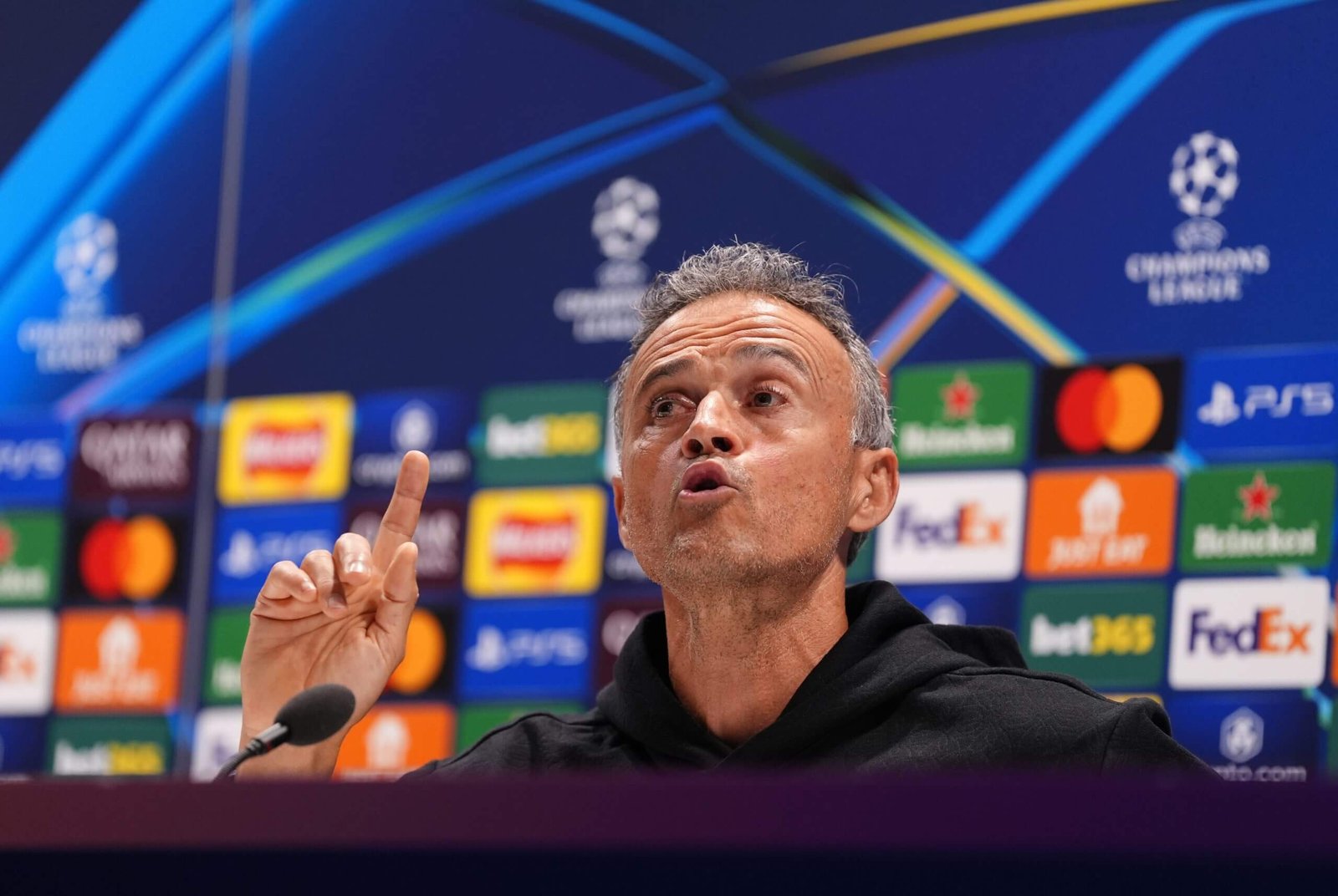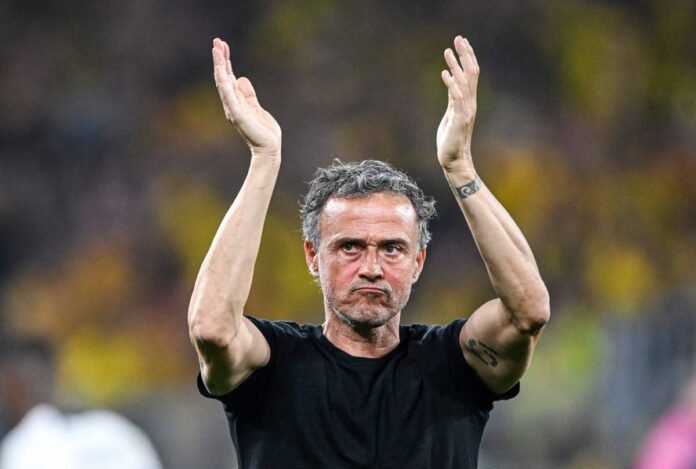Luis Enrique is one of football’s biggest personalities, making a behind-the-scenes documentary about his first season at Paris Saint-Germain all the more intriguing.
No Teneis Ni **** Idea (You Don’t Have a ******* Clue), released by Spanish broadcaster Movistar, charts the ups and downs of the 2023-24 campaign, from the saga over Kylian Mbappe’s future to Paris Saint-Germain’s run to the Champions League semi-finals. Viewers are also given a window into Luis Enrique’s personal life and the former Spain and Barcelona coach’s intense methods.
The title of the three-part series comes from a scene in which he says those who criticise his tactics don’t know what they’re talking about. Now we do have an idea of his life as a manager, here’s what we learned from watching.
Curious habits
Did you know Luis Enrique doesn’t drink milk, sometimes only eats one big meal a day and ‘grounds’ himself by walking barefoot around PSG’s training ground? Well, now you do.
The first ‘revelation’ comes when the 54-year-old invites the cameras into his house, telling us he only keeps a bottle of milk in the fridge for guests. He and his family — wife Elena Cullell and kids Pacho and Sira, who appear regularly throughout — apparently don’t drink it. His reasoning: what weaned animal continues to drink milk?
During the latter stages of PSG’s Champions League campaign, Luis Enrique explains he’s planning to eat one big meal a day to save time. And there are plenty of shots of his bare feet on grass pitches as he looks to centre himself — a practice he says helps him feel connected to nature and which he credits with getting rid of his allergies in the springtime.
Otherwise, we see just how active the former Barca and Real Madrid midfielder is, hanging from rings attached to the ceiling in his house and pausing one meeting with his coaching staff to perform push-ups using a desk. Cycling also features heavily — he has previously competed in mountain bike races and we see him riding around Paris here.
He really doesn’t care what people think
Perhaps the most surprising thing about this documentary is that it happened at all: Luis Enrique is not a fan of speaking to the press, as he makes clear on several occasions. At one point, he says he would be willing to cut his salary by 25 per cent if it meant no media engagements.
“I don’t want to be perfect or get on with everyone,” he says. “I don’t care how I get on with people, I prefer that they speak badly about me.” Elena, his wife, is less convinced. “This affects me, so don’t prefer that,” she responds.
Luis Enrique suggests that leads to harsher criticism for his teams, with reporters supposedly keen to stick the boot in.

Luis Enrique says he would give up 25 per cent of his salary to avoid media commitments (Bradley Collyer/PA Images via Getty Images)
We see punchy press conferences from the PSG boss, such as when he says his style of play represents Barca better than then-coach Xavi before their Champions League quarter-final last term. Or when he criticises a Spanish reporter for a typically “negative” question about what will happen if his side are knocked out of the competition in the semi-finals.
“The sun will come out,” he replies. “When the sun comes out in Paris, it’s marvellous.”
His relationship with Mbappe
This series was always likely to make Mbappe one of its main subjects after his contract standoff with PSG last season.
The France forward was placed in a separate training group during Luis Enrique’s first month in charge after telling the club he wouldn’t exercise a one-year contract extension in his deal, meaning he could leave on a free transfer last summer. Mbappe was eventually reintegrated into the squad after reaching an agreement with the club, before telling them he would go at the end of the season and move to Real Madrid (the two parties are still in dispute over €55million (£46m; $60m) Mbappe claims is owed to him in unpaid wages and bonuses).
Luis Enrique is demanding with Mbappe. A scene that has since been widely shared on social media shows the coach holding a one-on-one meeting with the forward in which he urges him to do more defensive work if he wants to be like his basketball idol Michael Jordan.
“I’ve read that you like Michael Jordan,” Luis Enrique tells him. “Michael Jordan grabbed all his team-mates’ balls and defended like a son of a b****. You’ve got to give that example, first as a person and as a player, to go and defend.”
“He leído que te gustaba Michael Jordan”.
“Michael Jordan se ponía a defender como un hijo de p***”.#LuisEnrique 🗣️ Mbappé
📼 Lunes 7, ‘𝑵𝒐 𝒕𝒆𝒏𝒆́𝒊𝒔 𝒏𝒊 **** 𝒊𝒅𝒆𝒂’ Capítulo 2. pic.twitter.com/VSYqtTAIsl
— Fútbol en Movistar Plus+ (@MovistarFutbol) October 3, 2024
Luis Enrique refers to him as “Kiki” and addresses him directly in team meetings before Champions League games against Real Sociedad and Barcelona, calling on him to be a leader. But he also says his PSG team will be even better without Mbappe and that he will be able to control more game situations given the forward’s lack of effort in defence.
The message is clear: nobody is more important than the team, not even Mbappe.
Philosophy is everything
Luis Enrique’s obsession with style has sometimes hampered his teams, but here we get a clear sense of how much philosophy matters to him.
The series opens with the coach drilling his side in “juego de posicion” (positional play) and there’s a memorable rant at half-time of the Champions League round-of-16 first leg against Real Sociedad — he sends a water bottle flying across the dressing room and says he doesn’t mind being eliminated from the competition as long as it’s “by playing football”. PSG went on to win that game 2-0.
😡 “Si tengo que quedar eliminado de la Champions… ¡Va a ser jugando al fútbol!”.
📽️ 𝐍𝐨 𝐭𝐞𝐧𝐞𝐢𝐬 𝐧𝐢 **** 𝐢𝐝𝐞𝐚…: 𝐂’𝐞𝐬𝐭 𝐜𝐚𝐭𝐚𝐬𝐭𝐫𝐨𝐩𝐡𝐢𝐪𝐮𝐞.
🆕 Capítulo 2, a las 22:00 en Movistar Plus+ (Dial 7). #LuisEnrique
📎 Ya en VOD: https://t.co/SvV7eajU8S pic.twitter.com/4ksKeU0Mgx
— Fútbol en Movistar Plus+ (@MovistarFutbol) October 7, 2024
Some of the more revealing comments are reserved for Xavi’s Barca. Luis Enrique says they aren’t “defensively good” and aren’t “a team that keeps the ball”. He claims that goalkeeper Marc-Andre ter Stegen broke a record for the number of long balls he played after PSG lose the first leg of the Champions League quarter-final against Barca and describes their approach as “hoofing it like Eibar”.
When Luis Enrique’s message works, it works spectacularly well. Before the second leg of the quarter-final, he tells his players to instantly press defender Ronald Araujo on the ball as “he’s the player with the most problems”. Araujo starts the move that leads to Raphinha’s 12th-minute goal after not being closed down — but the Uruguayan is later sent off after losing possession and bringing down Bradley Barcola.
It doesn’t always work, of course. He repeats the French phrase “on va gagner” (we will win) before the second leg of their Champions League semi-final — but Borussia Dortmund go through in Paris after a header from Mats Hummels, who Luis Enrique’s staff highlighted as a threat in an analysis session before the game.
Personal loss
The most moving parts of the documentary are when Luis Enrique talks about Xana, his daughter who died aged nine in 2019 after suffering from osteosarcoma (bone cancer). The final episode of the series is named after her.
He describes in detail the toll the disease took on her and the family and how he had to tell his mother to put up photos of Xana in her house after she had taken them down because she is still alive “in a spiritual sense”.
Luis Enrique and his family set up the Fundacion Xana to help families with children affected by serious illnesses, hosting a dinner in her memory to raise funds for the charity this year.
”¿Yo me puedo considerar afortunado o desgraciado? Yo me considero afortunado, muy afortunado. Mi hija Xana vino a vivir con nosotros 9 años maravillosos”. #LuisEnrique pic.twitter.com/rlb6pXCXnU
— Fútbol en Movistar Plus+ (@MovistarFutbol) October 14, 2024
“Can I consider myself lucky or unlucky? I consider myself to be lucky, very lucky,” Luis Enrique says. “My daughter lived nine marvellous years with us. We’ve got a thousand memories of her, videos, incredible things.”
Perhaps that helps explain why Luis Enrique says he has never cried over losing a football match. “Life or death?” he says. “Go to a hospital and you’ll see what life or death is.”
(Top photo: ANP via Getty Images)
Read the full article here


